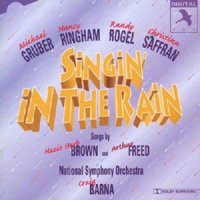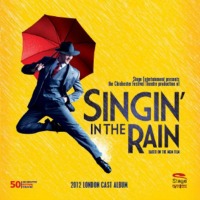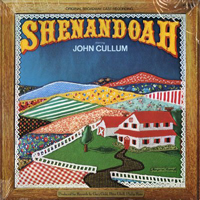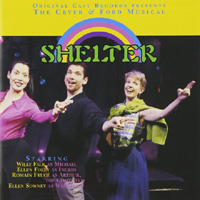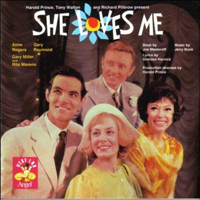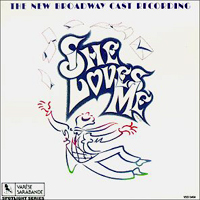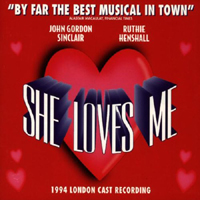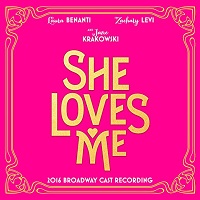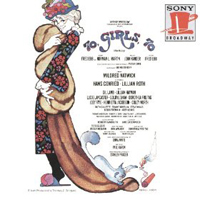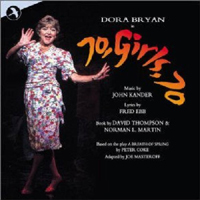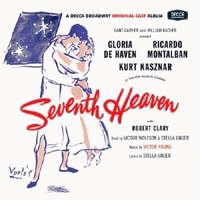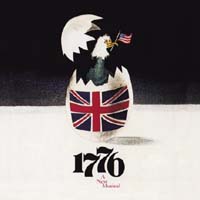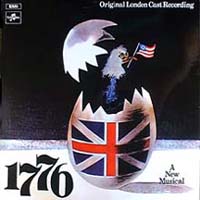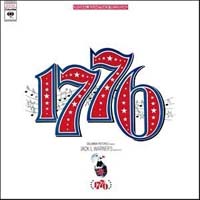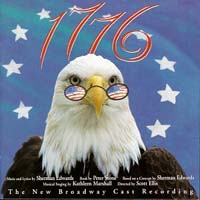 Original London Cast, 1928 (Columbia/HMV/Pearl)
Original London Cast, 1928 (Columbia/HMV/Pearl)  (3 / 5) Composer Jerome Kern and librettist-lyricist Oscar Hammerstein’s groundbreaking musical Show Boat premiered in New York in 1927, before the concept of original Broadway cast albums had been established. This album includes selections from the Show Boat score with members of the original London cast, plus other material. Performed here by what is billed as “The Mississippi Chorus” are tab versions of “Cotton Blossom,” “Queenie’s Ballyhoo,” “In Dahomey,” and “Can’t Help Lovin’ Dat Man,” all in their original choral arrangements. In “Make Believe,” Edith Day is a charming Magnolia, and Howett Worster a very fine Ravenal in all three of his duets with Day. In London, Paul Robeson finally got to play the role of Joe, which was written for him but not played by him during the original Broadway run. Unfortunately, the “Ol’ Man River” chosen for inclusion here is Robeson’s surprisingly casual 1928 studio recording with the Paul Whiteman Orchestra. (Also represented on this disc is the Joe of the original Broadway production, Jules Bledsoe, who offers a suitably tough and angry “Ol’ Man River.”) Marie Burke’s “Can’t Help Lovin’ Dat Man” and “Bill” are good, if unexceptional. Day’s “Dance Away the Night,” written for this production, is bright and bouncy. The Pearl CD also includes selections performed by the London casts of Kern’s Sunny and Rodgers and Hart’s Lido Lady. — Jeffrey Dunn
(3 / 5) Composer Jerome Kern and librettist-lyricist Oscar Hammerstein’s groundbreaking musical Show Boat premiered in New York in 1927, before the concept of original Broadway cast albums had been established. This album includes selections from the Show Boat score with members of the original London cast, plus other material. Performed here by what is billed as “The Mississippi Chorus” are tab versions of “Cotton Blossom,” “Queenie’s Ballyhoo,” “In Dahomey,” and “Can’t Help Lovin’ Dat Man,” all in their original choral arrangements. In “Make Believe,” Edith Day is a charming Magnolia, and Howett Worster a very fine Ravenal in all three of his duets with Day. In London, Paul Robeson finally got to play the role of Joe, which was written for him but not played by him during the original Broadway run. Unfortunately, the “Ol’ Man River” chosen for inclusion here is Robeson’s surprisingly casual 1928 studio recording with the Paul Whiteman Orchestra. (Also represented on this disc is the Joe of the original Broadway production, Jules Bledsoe, who offers a suitably tough and angry “Ol’ Man River.”) Marie Burke’s “Can’t Help Lovin’ Dat Man” and “Bill” are good, if unexceptional. Day’s “Dance Away the Night,” written for this production, is bright and bouncy. The Pearl CD also includes selections performed by the London casts of Kern’s Sunny and Rodgers and Hart’s Lido Lady. — Jeffrey Dunn
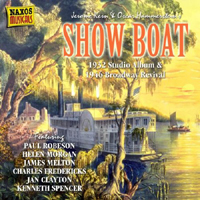 Original Broadway and Studio Casts, 1932 (Columbia-CBS/ASV-Living Era/Naxos)
Original Broadway and Studio Casts, 1932 (Columbia-CBS/ASV-Living Era/Naxos)  (2 / 5) Some worthy performances are collected here. Helen Morgan, who famously created the role of Julie in the original Broadway production of Show Boat and played it again in the 1932 revival, as well as in the 1936 film version, sings “Can’t Help Lovin’ Dat Man” and “Bill.” Paul Robeson, who was Joe in the ’32 revival, delivers a stirring “Ol’ Man River.” James Melton is overly florid in solo versions of “Make Believe” and “You Are Love,” but Countess Olga Albani displays a nice soprano in “Why Do I Love You?” (with Frank Munn). An overture and finale are also included, with eight selections conducted by Victor Young. — J.D.
(2 / 5) Some worthy performances are collected here. Helen Morgan, who famously created the role of Julie in the original Broadway production of Show Boat and played it again in the 1932 revival, as well as in the 1936 film version, sings “Can’t Help Lovin’ Dat Man” and “Bill.” Paul Robeson, who was Joe in the ’32 revival, delivers a stirring “Ol’ Man River.” James Melton is overly florid in solo versions of “Make Believe” and “You Are Love,” but Countess Olga Albani displays a nice soprano in “Why Do I Love You?” (with Frank Munn). An overture and finale are also included, with eight selections conducted by Victor Young. — J.D.
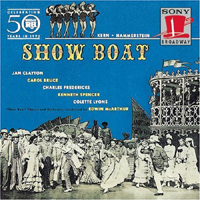 Broadway Cast, 1946 (Columbia/Sony)
Broadway Cast, 1946 (Columbia/Sony)  (2 / 5) For this revival, Oscar Hammerstein stripped away many of the comedy aspects of Show Boat and focused on the drama. Robert Russell Bennett revised his 1927 orchestrations to give them a more 1940s Broadway sound. The new overture is well conducted by Edwin McArthur, but “Cotton Blossom” is rushed and sounds strangely old-fashioned on this recording. While Jan Clayton is an earnest Magnolia, Charles Fredericks lacks character as Ravenal. The orchestral lead-in to “Ol’ Man River” is almost laughable; Kenneth Spencer restores some dignity to the song with his earthy approach but, unfortunately, the second verse is omitted. Carol Bruce began the tradition of Julies who are less soprano and more husky-voiced, making impressively throaty sounds in both “Can’t Help Lovin’ Dat Man” and “Bill.” Colette Lyons is a conventional soubrette as Ellie, squeakily cute in a very brisk version of “Life Upon the Wicked Stage” that includes some of “I Might Fall Back on You” as dance music. Jan Clayton’s “Nobody Else but Me,” reputedly the last song Kern ever wrote, brings this 10-track recording to a lively finish. — J.D.
(2 / 5) For this revival, Oscar Hammerstein stripped away many of the comedy aspects of Show Boat and focused on the drama. Robert Russell Bennett revised his 1927 orchestrations to give them a more 1940s Broadway sound. The new overture is well conducted by Edwin McArthur, but “Cotton Blossom” is rushed and sounds strangely old-fashioned on this recording. While Jan Clayton is an earnest Magnolia, Charles Fredericks lacks character as Ravenal. The orchestral lead-in to “Ol’ Man River” is almost laughable; Kenneth Spencer restores some dignity to the song with his earthy approach but, unfortunately, the second verse is omitted. Carol Bruce began the tradition of Julies who are less soprano and more husky-voiced, making impressively throaty sounds in both “Can’t Help Lovin’ Dat Man” and “Bill.” Colette Lyons is a conventional soubrette as Ellie, squeakily cute in a very brisk version of “Life Upon the Wicked Stage” that includes some of “I Might Fall Back on You” as dance music. Jan Clayton’s “Nobody Else but Me,” reputedly the last song Kern ever wrote, brings this 10-track recording to a lively finish. — J.D.
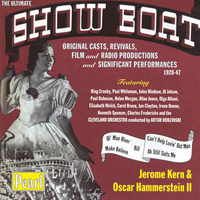 The Ultimate Show Boat, 1928-1947 (various labels/Pearl, 2CDs)
The Ultimate Show Boat, 1928-1947 (various labels/Pearl, 2CDs)  (2 / 5) This attempt to be the “ultimate” recording is a 1999 compilation that includes the cast album of the 1946 Broadway revival, the eight-song album of 1932, and a Show Boat orchestral “Scenario.” It also offers nine (!) versions of “Ol’ Man River”: four by Paul Robeson and one each by Jules Bledsoe, Kenneth Spencer, Todd Duncan, Al Jolson (bizarre), and Bing Crosby (baffling). Helen Morgan’s two recordings from 1928 are here, and so is Tess Gardella’s “Can’t Help Lovin’ Dat Man.” Further inclusions: vintage recordings of two non-Kern songs usually heard in the Act II Trocadero scene, “After the Ball” and “Goodbye My Lady Love,” with the latter sung by its writer, Joseph E. Howard; and “I Still Suits Me” in a solo version by Robeson, plus another version that pairs him with Elisabeth Welch. Finally, there’s some material featuring Allan Jones, Irene Dunn, and Charles Winninger, three of the stars of the 1936 Show Boat film. — J.D.
(2 / 5) This attempt to be the “ultimate” recording is a 1999 compilation that includes the cast album of the 1946 Broadway revival, the eight-song album of 1932, and a Show Boat orchestral “Scenario.” It also offers nine (!) versions of “Ol’ Man River”: four by Paul Robeson and one each by Jules Bledsoe, Kenneth Spencer, Todd Duncan, Al Jolson (bizarre), and Bing Crosby (baffling). Helen Morgan’s two recordings from 1928 are here, and so is Tess Gardella’s “Can’t Help Lovin’ Dat Man.” Further inclusions: vintage recordings of two non-Kern songs usually heard in the Act II Trocadero scene, “After the Ball” and “Goodbye My Lady Love,” with the latter sung by its writer, Joseph E. Howard; and “I Still Suits Me” in a solo version by Robeson, plus another version that pairs him with Elisabeth Welch. Finally, there’s some material featuring Allan Jones, Irene Dunn, and Charles Winninger, three of the stars of the 1936 Show Boat film. — J.D.
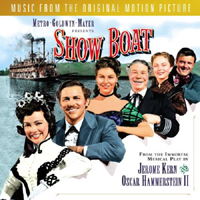 Film Soundtrack, 1951 (MGMlRhino-Turner)
Film Soundtrack, 1951 (MGMlRhino-Turner)  (2 / 5) Because so much background scoring is included here, this CD almost sounds like a Show Boat suite for voices and orchestra, conducted and played very slowly. Howard Keel and Kathryn Grayson are in top form, and the MGM Orchestra makes magnificent sounds as conducted by Adolph Deutsch. It’s fun to hear Marge and Gower Champion sing “I Might Fall Back on You” and “Life Upon the Wicked Stage,” even if one can’t see them dance on the soundtrack album. There is a powerful if somewhat turgid “Ol’ Man River” by William Warfield, and a lovely “Make Believe” reprise by Keel. Annette Warren sings Julie’s songs for Ava Gardner, as in the film, but the bonus tracks of the Rhino CD give us Gardner herself singing “Can’t Help Lovin’ Dat Man” and “Bill” very well, indeed. — J.D.
(2 / 5) Because so much background scoring is included here, this CD almost sounds like a Show Boat suite for voices and orchestra, conducted and played very slowly. Howard Keel and Kathryn Grayson are in top form, and the MGM Orchestra makes magnificent sounds as conducted by Adolph Deutsch. It’s fun to hear Marge and Gower Champion sing “I Might Fall Back on You” and “Life Upon the Wicked Stage,” even if one can’t see them dance on the soundtrack album. There is a powerful if somewhat turgid “Ol’ Man River” by William Warfield, and a lovely “Make Believe” reprise by Keel. Annette Warren sings Julie’s songs for Ava Gardner, as in the film, but the bonus tracks of the Rhino CD give us Gardner herself singing “Can’t Help Lovin’ Dat Man” and “Bill” very well, indeed. — J.D.
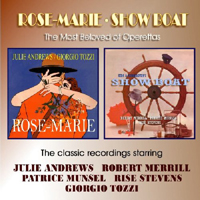 Studio Cast, 1956 (RCA/Flare) No stars; not recommended. One of the greatest of all musical theater scores goes down in defeat here. An early “crossover” recording, this entry features Metropolitan Opera stars Robert Merrill, Patrice Munsel, and Rise Stevens. Their singing is disappointingly colorless, as are Janet Pavek and Kevin Scott’s turns as Ellie and Frank. The orchestrations aren’t the originals, and aren’t very good. “Dance Away the Night,” written for the 1928 London staging, is given a lifeless performance here. The album also includes “Till Good Luck Comes My Way,” often omitted from productions and recordings of Show Boat; Merrill makes this song dull, too, but he can’t be fully blamed for his “Ol’ Man River,” which was a bad idea in the first place. [Ed. Note: Flare’s CD also features selections from Rose Marie with Julie Andrews and Giorgio Tozzi.] — J.D.
Studio Cast, 1956 (RCA/Flare) No stars; not recommended. One of the greatest of all musical theater scores goes down in defeat here. An early “crossover” recording, this entry features Metropolitan Opera stars Robert Merrill, Patrice Munsel, and Rise Stevens. Their singing is disappointingly colorless, as are Janet Pavek and Kevin Scott’s turns as Ellie and Frank. The orchestrations aren’t the originals, and aren’t very good. “Dance Away the Night,” written for the 1928 London staging, is given a lifeless performance here. The album also includes “Till Good Luck Comes My Way,” often omitted from productions and recordings of Show Boat; Merrill makes this song dull, too, but he can’t be fully blamed for his “Ol’ Man River,” which was a bad idea in the first place. [Ed. Note: Flare’s CD also features selections from Rose Marie with Julie Andrews and Giorgio Tozzi.] — J.D.
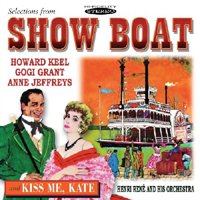 Studio Cast, 1958 (RCA/Sepia) No stars; not recommended. From the overture on, this recording makes you feel like you’re trapped in an elevator, so Muzak-like is Henri René’s orchestra (no arranger credited). Howard Keel is in good voice but seems dramatically detached, and Anne Jeffreys’ usually lustrous soprano sounds like it’s under wraps. Gogi Grant is a torchy Julie in too-slow renditions of “Can’t Help Lovin’ Dat Man” and “Bill.” Although there are a few interesting inclusions — such as “Nobody Else but Me,” “Till Good Luck Comes My Way,” and “Where’s the Mate for Me?” — this Show Boat sinks. — J.D.
Studio Cast, 1958 (RCA/Sepia) No stars; not recommended. From the overture on, this recording makes you feel like you’re trapped in an elevator, so Muzak-like is Henri René’s orchestra (no arranger credited). Howard Keel is in good voice but seems dramatically detached, and Anne Jeffreys’ usually lustrous soprano sounds like it’s under wraps. Gogi Grant is a torchy Julie in too-slow renditions of “Can’t Help Lovin’ Dat Man” and “Bill.” Although there are a few interesting inclusions — such as “Nobody Else but Me,” “Till Good Luck Comes My Way,” and “Where’s the Mate for Me?” — this Show Boat sinks. — J.D.
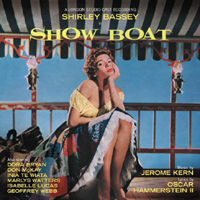 Studio Cast, 1959 (EMI/no CD)
Studio Cast, 1959 (EMI/no CD)  (1 / 5) A wild combination of disparate elements, this recording has soupy arrangements, tempi that are often woefully slow, and awful orchestrations. Shirley Bassey is a restrained Julie. On the plus side, New Zealander Inia Te Wiata’s “Ol’ Man River” is well sung. Don McKay and Marlys Watters display lovely voices in their three big duets as Ravenal and Magnolia, while Dora Bryan’s Ellie exudes showbiz know-how in “Life Upon the Wicked Stage” and, with Geoffrey Webb, in “I Might Fall Back on You.” — J.D.
(1 / 5) A wild combination of disparate elements, this recording has soupy arrangements, tempi that are often woefully slow, and awful orchestrations. Shirley Bassey is a restrained Julie. On the plus side, New Zealander Inia Te Wiata’s “Ol’ Man River” is well sung. Don McKay and Marlys Watters display lovely voices in their three big duets as Ravenal and Magnolia, while Dora Bryan’s Ellie exudes showbiz know-how in “Life Upon the Wicked Stage” and, with Geoffrey Webb, in “I Might Fall Back on You.” — J.D.
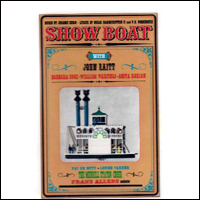 Studio Cast, 1961 (Columbia/Sony)
Studio Cast, 1961 (Columbia/Sony)  (1 / 5) Theatricality is missing from this Show Boat. While John Raitt’s Ravenal and Barbara Cook’s Magnolia are nicely sung, “Make Believe”seems incomplete here. The duo’s recording of “You Are Love”is only adequate, and the singers are swamped by the orchestrations in “Why Do I Love You?” William Warfield is solid but unexciting in Joe’s “Ol’ Man River.” Anita Darian’s Julie is almost coquettish in “Bill,” warm and honest when caressing “Can’t Help Lovin’ Dat Man.” Fay DeWitt has a bubbly belt and is reasonably droll in Ellie’s “Life Upon the Wicked Stage,” but the female chorus drags down the number. In fact, every time the Merrill Staton Choir takes over, singing with little feeling, there is a deadening effect. The orchestra, playing uncredited orchestrations, is led by Franz Allers. Four bonus tracks on the CD reissue offer Tess Gardella in a bang-up version of “Can’t Help Lovin’ Dat Man” (recorded in 1928), Helen Morgan singing “Bill” with the Victor Young Orchestra (1932), Paul Robeson in a solo version of the duet “I Still Suits Me” (1947), and Jan Clayton singing “Nobody Else But Me.” — J.D.
(1 / 5) Theatricality is missing from this Show Boat. While John Raitt’s Ravenal and Barbara Cook’s Magnolia are nicely sung, “Make Believe”seems incomplete here. The duo’s recording of “You Are Love”is only adequate, and the singers are swamped by the orchestrations in “Why Do I Love You?” William Warfield is solid but unexciting in Joe’s “Ol’ Man River.” Anita Darian’s Julie is almost coquettish in “Bill,” warm and honest when caressing “Can’t Help Lovin’ Dat Man.” Fay DeWitt has a bubbly belt and is reasonably droll in Ellie’s “Life Upon the Wicked Stage,” but the female chorus drags down the number. In fact, every time the Merrill Staton Choir takes over, singing with little feeling, there is a deadening effect. The orchestra, playing uncredited orchestrations, is led by Franz Allers. Four bonus tracks on the CD reissue offer Tess Gardella in a bang-up version of “Can’t Help Lovin’ Dat Man” (recorded in 1928), Helen Morgan singing “Bill” with the Victor Young Orchestra (1932), Paul Robeson in a solo version of the duet “I Still Suits Me” (1947), and Jan Clayton singing “Nobody Else But Me.” — J.D.
 Music Theater of Lincoln Center Cast, 1966 (RCA)
Music Theater of Lincoln Center Cast, 1966 (RCA)  (4 / 5) This fine, succinct cast album deletes the opening chorus of “Cotton Blossom,” but from then on, most of the major songs of Show Boat are heard in fairly complete versions, very well sung and convincingly acted. Barbara Cook (Magnolia) and Stephen Douglass (Ravenal) do superlative work in their three duets: Broadway’s greatest soprano and one of its greatest baritenors truly soar when they raise their voices in “You Are Love,” “Make Believe,” and “Why Do I Love You?” The last-named song also has a comedic chorus sung by David Wayne as Captain Andy. (In the production, he sang it to Margaret Hamilton as Parthy, but she is not heard on the album.) “Can’t Help Lovin’ Dat Man” is sung with feeling by Constance Towers as Julie, with Rosetta LeNoire and the spirited chorus lending strong support. Towers’ “Bill” is also lovely. Allyn Ann McLerie is definitive in Ellie’s “Life Upon the Wicked Stage,” and the Act II opening is well done, if brief. Finally, this recording is blessed with a sensational “Ol’ Man River” sung by William Warfield, whose voice has incredible power and beauty throughout its range in a performance bursting with spontaneity. The Robert Russell Bennett reorchestrations are largely intact and lovingly conducted by the great Franz Allers. — J.D.
(4 / 5) This fine, succinct cast album deletes the opening chorus of “Cotton Blossom,” but from then on, most of the major songs of Show Boat are heard in fairly complete versions, very well sung and convincingly acted. Barbara Cook (Magnolia) and Stephen Douglass (Ravenal) do superlative work in their three duets: Broadway’s greatest soprano and one of its greatest baritenors truly soar when they raise their voices in “You Are Love,” “Make Believe,” and “Why Do I Love You?” The last-named song also has a comedic chorus sung by David Wayne as Captain Andy. (In the production, he sang it to Margaret Hamilton as Parthy, but she is not heard on the album.) “Can’t Help Lovin’ Dat Man” is sung with feeling by Constance Towers as Julie, with Rosetta LeNoire and the spirited chorus lending strong support. Towers’ “Bill” is also lovely. Allyn Ann McLerie is definitive in Ellie’s “Life Upon the Wicked Stage,” and the Act II opening is well done, if brief. Finally, this recording is blessed with a sensational “Ol’ Man River” sung by William Warfield, whose voice has incredible power and beauty throughout its range in a performance bursting with spontaneity. The Robert Russell Bennett reorchestrations are largely intact and lovingly conducted by the great Franz Allers. — J.D.
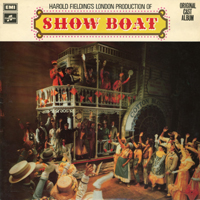 London Cast, 1971 (EMI-Stanyan/LaserLight)
London Cast, 1971 (EMI-Stanyan/LaserLight)  (3 / 5) Although musically inauthentic in many ways, the 1971 London production of Show Boat ran for more than 900 performances. What makes the cast album most special is the presence of Cleo Laine as Julie; her “Bill” is achingly beautiful and deeply felt, her “Can’t Help Lovin’ Dat Man” is rich in sultry tone and thrilling riffs, and her “Nobody Else But Me” is delivered as a soulful ballad. André Jobin as Ravenal and Lorna Dallas as Magnolia sing their songs beautifully. Kenneth Nelson and Jan Hunt are very lively as Frank and Ellie, performing in fine vaudeville style to enjoyable effect in the interpolated “How’d You Like to Spoon With Me?” Thomas Carey is good as Joe in “Ol’ Man River,” and Ena Cabayo makes a distinctive Queenie. Included for this recording, but not in the production itself, were “Life Upon the Wicked Stage,” “Till Good Luck Comes My Way,” “I Have the Room Above Her,” and “I Still Suits Me” — but note that the LaserLight edition is a one-CD album of highlights from the album, which was originally released on two LPs. — J.D.
(3 / 5) Although musically inauthentic in many ways, the 1971 London production of Show Boat ran for more than 900 performances. What makes the cast album most special is the presence of Cleo Laine as Julie; her “Bill” is achingly beautiful and deeply felt, her “Can’t Help Lovin’ Dat Man” is rich in sultry tone and thrilling riffs, and her “Nobody Else But Me” is delivered as a soulful ballad. André Jobin as Ravenal and Lorna Dallas as Magnolia sing their songs beautifully. Kenneth Nelson and Jan Hunt are very lively as Frank and Ellie, performing in fine vaudeville style to enjoyable effect in the interpolated “How’d You Like to Spoon With Me?” Thomas Carey is good as Joe in “Ol’ Man River,” and Ena Cabayo makes a distinctive Queenie. Included for this recording, but not in the production itself, were “Life Upon the Wicked Stage,” “Till Good Luck Comes My Way,” “I Have the Room Above Her,” and “I Still Suits Me” — but note that the LaserLight edition is a one-CD album of highlights from the album, which was originally released on two LPs. — J.D.
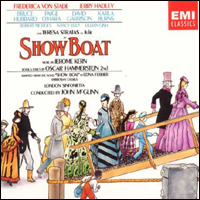 Studio Cast, 1988 (EMI, 3CDs)
Studio Cast, 1988 (EMI, 3CDs)  (5 / 5) This complete set is the one indispensable recording of Show Boat. Five classic songs — “Make Believe,” “Ol’ Man River,” “Can’t Help Lovin’ Dat Man,” “You Are Love,” and “Bill” (lyrics partly by P. G. Wodehouse) — have survived every permutation of the show, and “Why Do I Love You?” has survived most, but other songs have been included or excluded from each of the numerous productions and recordings. This album offers every extant piece of music ever written for Show Boat: the complete score as heard on Broadway in 1927; portions that had been deleted during road tryouts; songs added for the many revivals and the 1936 film version; and a lot of dialogue, most of it underscored. Only some music for scene changes and a few incidentals are omitted. John McGlinn reconstructed the score and conducts this truly monumental recording, which also includes all or most of the show’s dialogue. From the first chord of the original overture, intermingling the score’s ever-changing moods, it’s clear that the result is unique. Opera stars Frederica Von Stade and Jerry Hadley, as Magnolia and Ravenal, act almost as well as they sing. Playing Julie is another opera star, the magnificent Teresa Stratas, who combines the inner strength of the character with a touching vulnerability. Representing the unrecorded 1983 Broadway revival of Show Boat are Paige O’Hara as Ellie, Bruce Hubbard as Joe, and Karla Burns as Queenie — all of them terrific. Hubbard’s “Ol’ Man River” is warm, wise, and sung with the right amount of power mixed with resignation. Two other Broadway veterans, Robert Nichols and David Garrison, bring their talents and good humor to the roles of Captain Andy and Frank, respectively. The supporting roles are also luxuriously cast, which helps boost this recording to such a high level. It’s a revelatory experience, whether one is hearing the astonishing “Mis’ry’s Comin’ Aroun'” for the first time or simply marveling at how the individual pieces of the score fit together. — J.D.
(5 / 5) This complete set is the one indispensable recording of Show Boat. Five classic songs — “Make Believe,” “Ol’ Man River,” “Can’t Help Lovin’ Dat Man,” “You Are Love,” and “Bill” (lyrics partly by P. G. Wodehouse) — have survived every permutation of the show, and “Why Do I Love You?” has survived most, but other songs have been included or excluded from each of the numerous productions and recordings. This album offers every extant piece of music ever written for Show Boat: the complete score as heard on Broadway in 1927; portions that had been deleted during road tryouts; songs added for the many revivals and the 1936 film version; and a lot of dialogue, most of it underscored. Only some music for scene changes and a few incidentals are omitted. John McGlinn reconstructed the score and conducts this truly monumental recording, which also includes all or most of the show’s dialogue. From the first chord of the original overture, intermingling the score’s ever-changing moods, it’s clear that the result is unique. Opera stars Frederica Von Stade and Jerry Hadley, as Magnolia and Ravenal, act almost as well as they sing. Playing Julie is another opera star, the magnificent Teresa Stratas, who combines the inner strength of the character with a touching vulnerability. Representing the unrecorded 1983 Broadway revival of Show Boat are Paige O’Hara as Ellie, Bruce Hubbard as Joe, and Karla Burns as Queenie — all of them terrific. Hubbard’s “Ol’ Man River” is warm, wise, and sung with the right amount of power mixed with resignation. Two other Broadway veterans, Robert Nichols and David Garrison, bring their talents and good humor to the roles of Captain Andy and Frank, respectively. The supporting roles are also luxuriously cast, which helps boost this recording to such a high level. It’s a revelatory experience, whether one is hearing the astonishing “Mis’ry’s Comin’ Aroun'” for the first time or simply marveling at how the individual pieces of the score fit together. — J.D.
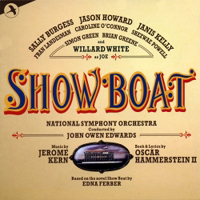 Studio Cast, 1993 (TER-JAY)
Studio Cast, 1993 (TER-JAY)  (3 / 5) This nearly complete recording based on the 1946 Broadway edition of Show Boat includes the rarely performed or recorded “In Dahomey” and a good deal of dialogue. John Owen Edwards does an excellent job of conducting the National Symphony Orchestra. Janis Kelly sings Magnolia superbly, and Jason Howard is a heavy-voiced but romantic Ravenal; their “Make Believe” duet is particularly impressive. Sally Burgess has the right vocal heft for Julie, displaying a legit voice with a lot of soul in her songs. Shezwae Powell is cutely sassy as Queenie, while Caroline O’Connor is nice and brassy as Ellie, but Willard White’s “Ol’ Man River” seems a bit too ponderous. — J.D.
(3 / 5) This nearly complete recording based on the 1946 Broadway edition of Show Boat includes the rarely performed or recorded “In Dahomey” and a good deal of dialogue. John Owen Edwards does an excellent job of conducting the National Symphony Orchestra. Janis Kelly sings Magnolia superbly, and Jason Howard is a heavy-voiced but romantic Ravenal; their “Make Believe” duet is particularly impressive. Sally Burgess has the right vocal heft for Julie, displaying a legit voice with a lot of soul in her songs. Shezwae Powell is cutely sassy as Queenie, while Caroline O’Connor is nice and brassy as Ellie, but Willard White’s “Ol’ Man River” seems a bit too ponderous. — J.D.
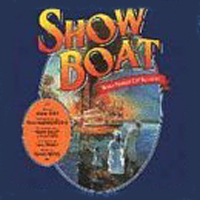 Original Toronto/Broadway Cast, 1994 (Quality Music)
Original Toronto/Broadway Cast, 1994 (Quality Music)  (4 / 5) Harold Prince and Susan Stroman created a new version of Show Boat that ran 946 performances on Broadway, beating the London record set in 1971. Recorded during the pre-Broadway Toronto run, this cast album features Robert Morse as Captain Andy. The fine orchestrations by Robert Russell Bennett and William David Brohn show respect for the originals while forging a Show Boat for the 1990s with restorations/inclusions such as “Mis’ry’s Comin’ Aroun’,” “Till Good Luck Comes My Way,” and “I Have the Room Above Her.” Here, “Why Do I Love You?” is done as a solo by Elaine Stritch in the previously nonsinging role of Parthy. “Kim’s Charleston” is a dance confection thrillingly whipped up by arranger David Krane. Also included is the music for both of Stroman’s great Act II montages. Rebecca Luker and Mark Jacoby are excellent as Magnolia and Ravenal — no sugary nonsense in either interpretation, but lots of beautiful vocalism. “Stunning” is the best word to describe Michel Bell’s unadorned, heartfelt “Ol’ Man River.” Lonette McKee as Julie is believable and expressive in “Can’t Help Lovin’ Dat Man” and “Bill,” neatly treading the fine line between legit authenticity and soul. Queenie is sung by the rich-voiced Gretha Boston, who won a Tony Award for her performance. Under Jeffrey Huard’s intelligent musical direction, the entire cast and the orchestra sound excellent throughout. — J.D.
(4 / 5) Harold Prince and Susan Stroman created a new version of Show Boat that ran 946 performances on Broadway, beating the London record set in 1971. Recorded during the pre-Broadway Toronto run, this cast album features Robert Morse as Captain Andy. The fine orchestrations by Robert Russell Bennett and William David Brohn show respect for the originals while forging a Show Boat for the 1990s with restorations/inclusions such as “Mis’ry’s Comin’ Aroun’,” “Till Good Luck Comes My Way,” and “I Have the Room Above Her.” Here, “Why Do I Love You?” is done as a solo by Elaine Stritch in the previously nonsinging role of Parthy. “Kim’s Charleston” is a dance confection thrillingly whipped up by arranger David Krane. Also included is the music for both of Stroman’s great Act II montages. Rebecca Luker and Mark Jacoby are excellent as Magnolia and Ravenal — no sugary nonsense in either interpretation, but lots of beautiful vocalism. “Stunning” is the best word to describe Michel Bell’s unadorned, heartfelt “Ol’ Man River.” Lonette McKee as Julie is believable and expressive in “Can’t Help Lovin’ Dat Man” and “Bill,” neatly treading the fine line between legit authenticity and soul. Queenie is sung by the rich-voiced Gretha Boston, who won a Tony Award for her performance. Under Jeffrey Huard’s intelligent musical direction, the entire cast and the orchestra sound excellent throughout. — J.D.
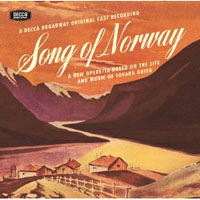 Original Broadway Cast Members, 1944 (Decca)
Original Broadway Cast Members, 1944 (Decca)  (4 / 5) “Hurry, Countess! The boys’ names are in the cakes! They’re starting the drawing!” So runs a typical line of dialogue in this peerlessly fruity operetta that’s supposedly based on the life of composer Edvard Grieg. Song of Norway was a smash hit and an auspicious Broadway debut for musical adapters and lyricists Robert Wright and George Forrest. The fanciful plot — Grieg loves Nina but is intercepted by a temperamental diva, escapes her clutches and writes the A Minor Concerto — hasn’t an original moment in it. The original production featured super singers, and this cast album, with its generous song-scenes and purple dialogue, certainly is an earful. Lawrence Brooks and Helena Bliss are appealing in the leads, even if, after yodeling the hit ballad “Strange Music,” Brooks has to rhapsodize: “Oh, Darling, to think we’ve just found each other!” And tenor Robert Shafer, as their poet comrade Nordraak, is spectacular. The role of the vexing diva Louisa Giovanni, played on Broadway by Irra Petina, is sung here by Decca’s house soprano, Kitty Carlisle. Although she doesn’t possess a magnificent voice, Carlisle dives head-first into the ridiculous text, and her classic vocal performance is something to treasure. — Marc Miller
(4 / 5) “Hurry, Countess! The boys’ names are in the cakes! They’re starting the drawing!” So runs a typical line of dialogue in this peerlessly fruity operetta that’s supposedly based on the life of composer Edvard Grieg. Song of Norway was a smash hit and an auspicious Broadway debut for musical adapters and lyricists Robert Wright and George Forrest. The fanciful plot — Grieg loves Nina but is intercepted by a temperamental diva, escapes her clutches and writes the A Minor Concerto — hasn’t an original moment in it. The original production featured super singers, and this cast album, with its generous song-scenes and purple dialogue, certainly is an earful. Lawrence Brooks and Helena Bliss are appealing in the leads, even if, after yodeling the hit ballad “Strange Music,” Brooks has to rhapsodize: “Oh, Darling, to think we’ve just found each other!” And tenor Robert Shafer, as their poet comrade Nordraak, is spectacular. The role of the vexing diva Louisa Giovanni, played on Broadway by Irra Petina, is sung here by Decca’s house soprano, Kitty Carlisle. Although she doesn’t possess a magnificent voice, Carlisle dives head-first into the ridiculous text, and her classic vocal performance is something to treasure. — Marc Miller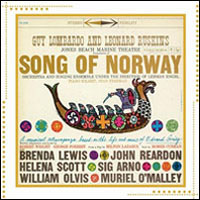 Jones Beach Marine Theatre Cast, 1959 (Columbia/Masterworks Broadway-Arkivmusic)
Jones Beach Marine Theatre Cast, 1959 (Columbia/Masterworks Broadway-Arkivmusic)  (3 / 5) Brenda Lewis is a trouper of a Louisa here, savoring her character’s temperament and attacking her high notes with mastery. Unfortunately, this cast album of a successful Song of Norway summer production — “One of the largest and costliest musicals ever presented on the living stage,” the liner notes crow — stints on the ripe operetta dialogue, so we’re left with a fairly straightforward presentation of material that shouldn’t have its silliness masked. The recording also omits some of the show’s most charming musical moments (“Midsummer Eve,” “At Christmastime”) to make room for the entire Piano Concerto in A Minor. Still, as conducted by Lehman Engel and backed by a chorus of 200, it’s a pretty grand performance. John Reardon is a rich-voiced Grieg, Helena Scott a pretty but brain-dead Nina. Sig Arno, a veteran of the original Broadway cast, still purrs ably through “Bon Vivant.” And, as Nordraak, William Olvis has a vibrato that could drill through cement. — M.M.
(3 / 5) Brenda Lewis is a trouper of a Louisa here, savoring her character’s temperament and attacking her high notes with mastery. Unfortunately, this cast album of a successful Song of Norway summer production — “One of the largest and costliest musicals ever presented on the living stage,” the liner notes crow — stints on the ripe operetta dialogue, so we’re left with a fairly straightforward presentation of material that shouldn’t have its silliness masked. The recording also omits some of the show’s most charming musical moments (“Midsummer Eve,” “At Christmastime”) to make room for the entire Piano Concerto in A Minor. Still, as conducted by Lehman Engel and backed by a chorus of 200, it’s a pretty grand performance. John Reardon is a rich-voiced Grieg, Helena Scott a pretty but brain-dead Nina. Sig Arno, a veteran of the original Broadway cast, still purrs ably through “Bon Vivant.” And, as Nordraak, William Olvis has a vibrato that could drill through cement. — M.M.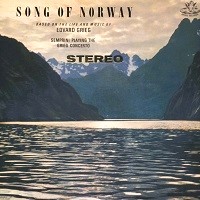 Studio Cast, 1961 (Angel/no CD)
Studio Cast, 1961 (Angel/no CD)  (3 / 5) Norman Newell had a nice run producing British stage musical cast recordings as well as many pop hits, and he also ventured occasionally into studio cast albums. This Norway is lushly recorded in early-’60s stereo. Michael Collins leads an orchestra much larger than any pit orchestra, but Collins does allow the tempi to drag fearfully in the waltzes. John Lawrenson is a sturdy Grieg, Norma Hughes a charming Nina, and if Thomas Round’s Nordraak doesn’t achieve the ringing high notes of Robert Shafer in the original, he declaims the silly Wright/Forrest lyrics with conviction. As Louisa, the strong-voiced Victoria Elliott, deprived of all the purple dialogue that Kitty Carlisle relishes on the original recording, makes less of an impression. A couple of songs are excluded, and one misses Sig Arno chewing his consonants through “Bon Vivant.” The album ends with a much fuller version of the Piano Concerto in A Minor than is heard on the Broadway cast album; Alberto Semprini, here billed simply as “Semprini,” is the soloist. This LP is not easy to find and probably not worth searching for, but if you do happen to see it in a bin at a used record store, you might want to snap it up. — M.M.
(3 / 5) Norman Newell had a nice run producing British stage musical cast recordings as well as many pop hits, and he also ventured occasionally into studio cast albums. This Norway is lushly recorded in early-’60s stereo. Michael Collins leads an orchestra much larger than any pit orchestra, but Collins does allow the tempi to drag fearfully in the waltzes. John Lawrenson is a sturdy Grieg, Norma Hughes a charming Nina, and if Thomas Round’s Nordraak doesn’t achieve the ringing high notes of Robert Shafer in the original, he declaims the silly Wright/Forrest lyrics with conviction. As Louisa, the strong-voiced Victoria Elliott, deprived of all the purple dialogue that Kitty Carlisle relishes on the original recording, makes less of an impression. A couple of songs are excluded, and one misses Sig Arno chewing his consonants through “Bon Vivant.” The album ends with a much fuller version of the Piano Concerto in A Minor than is heard on the Broadway cast album; Alberto Semprini, here billed simply as “Semprini,” is the soloist. This LP is not easy to find and probably not worth searching for, but if you do happen to see it in a bin at a used record store, you might want to snap it up. — M.M.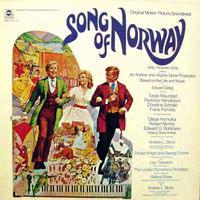 Film Soundtrack, 1970 (ABC/no CD)
Film Soundtrack, 1970 (ABC/no CD)  (2 / 5) The cinematic success of The Sound of Music inspired a parade of family-friendly movie musicals, but none followed the climb-ev’ry-mountain template as closely as this one. It features hillsides, streams, and Florence Henderson standing in for Julie Andrews. While the film itself is an atrocity, the soundtrack, surprisingly, is not. Grieg is Grieg, after all, and his music is played here by the London Symphony. The film retains just a few songs from the stage version; Wright and Forrest raided the Grieg catalog further and set others of his melodies to florid but not unintelligent lyrics. Toralv Maurstad as Grieg has very little voice, so most of the male vocals are assigned to Frank Porretta, a fine singer who nevertheless strains as the notes sail high above the staff. Fortunately, Harry Secombe steps in for three tracks, his ringing tenor as thrilling as ever. Henderson is her usual competent, unexciting self, though unexpectedly affecting in “The Little House” and “Wrong to Dream.” Roland Shaw is the very busy musical supervisor. — M.M.
(2 / 5) The cinematic success of The Sound of Music inspired a parade of family-friendly movie musicals, but none followed the climb-ev’ry-mountain template as closely as this one. It features hillsides, streams, and Florence Henderson standing in for Julie Andrews. While the film itself is an atrocity, the soundtrack, surprisingly, is not. Grieg is Grieg, after all, and his music is played here by the London Symphony. The film retains just a few songs from the stage version; Wright and Forrest raided the Grieg catalog further and set others of his melodies to florid but not unintelligent lyrics. Toralv Maurstad as Grieg has very little voice, so most of the male vocals are assigned to Frank Porretta, a fine singer who nevertheless strains as the notes sail high above the staff. Fortunately, Harry Secombe steps in for three tracks, his ringing tenor as thrilling as ever. Henderson is her usual competent, unexciting self, though unexpectedly affecting in “The Little House” and “Wrong to Dream.” Roland Shaw is the very busy musical supervisor. — M.M.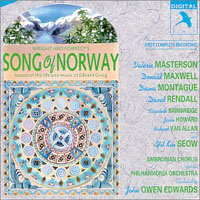 Studio Cast, 1990 (JAY, 2CDs)
Studio Cast, 1990 (JAY, 2CDs)  (3 / 5) Spreading Song of Norway over two CDs has its advantages: more Grieg (with a smattering of Verdi in a Traviata excerpt), more imperishable dialogue, and more complete song scenes. The Act I finale, for instance, builds and builds before fading into a satisfying pianissimo. But John Owen Edwards’ conducting is slightly stolid, and the overall performance style is more dutiful than inspired. As compared with the cast of the 1944 recording, the singers heard here don’t have the sort of natural artificiality that’s required. Diana Montague comes close as Louisa, her killer soprano hitting the right notes of haughtiness. But Donald Maxwell’s chirpy Grieg sounds like a first reading; David Rendall’s Nordraak is resonant but flat-out boring; and the usually reliable Valerie Masterson is a so-so Nina, shrill in her upper register. Concert pianist Yit Kin Seow plunges avidly into the concerto, and Wright and Forrest contribute an informative if self-serving essay to the accompanying booklet. — M.M.
(3 / 5) Spreading Song of Norway over two CDs has its advantages: more Grieg (with a smattering of Verdi in a Traviata excerpt), more imperishable dialogue, and more complete song scenes. The Act I finale, for instance, builds and builds before fading into a satisfying pianissimo. But John Owen Edwards’ conducting is slightly stolid, and the overall performance style is more dutiful than inspired. As compared with the cast of the 1944 recording, the singers heard here don’t have the sort of natural artificiality that’s required. Diana Montague comes close as Louisa, her killer soprano hitting the right notes of haughtiness. But Donald Maxwell’s chirpy Grieg sounds like a first reading; David Rendall’s Nordraak is resonant but flat-out boring; and the usually reliable Valerie Masterson is a so-so Nina, shrill in her upper register. Concert pianist Yit Kin Seow plunges avidly into the concerto, and Wright and Forrest contribute an informative if self-serving essay to the accompanying booklet. — M.M.


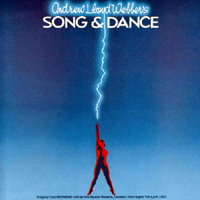

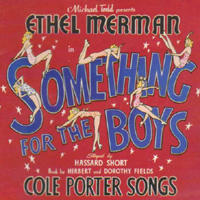
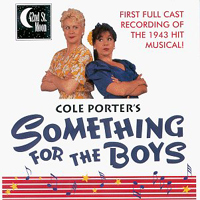
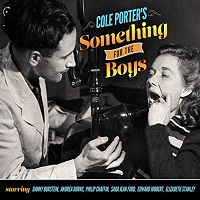

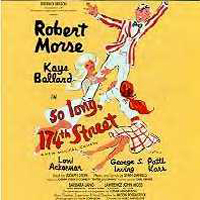
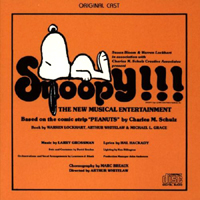
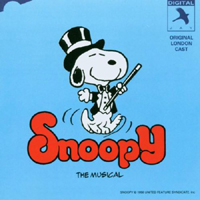
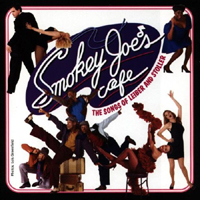

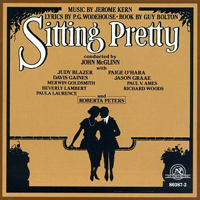
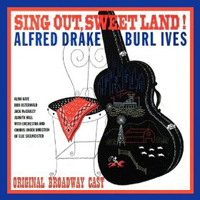
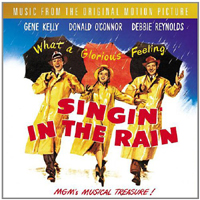
 (5 / 5) For many, Singin’ in the Rain remains the greatest movie musical of all time. The mere image of Gene Kelly splashing around in those Hollywood puddles would be enough for some; for many others, the greatness of the film is that it’s one of the rare musicals, on stage or screen, that has a script (by Betty Comden and Adolph Green) equal in quality to its musical moments. If it isn’t possible to sock across the dialogue on a soundtrack album, two CD releases do a great job with the music. As part of its series of releases of MGM musical soundtrack recordings, Rhino-Turner did an excellent job with Singin’ in the Rain. A one-disc version gives us all of the songs plus a few extras; a two-disc set adds still more, including the original recordings of many of the wonderful old songs by Arthur Freed and Nacio Herb Brown that make up most of the film’s score. All of the movie tracks sound great, and it’s interesting to hear the underscoring without dialogue and sound effects. Another treat is listening in on material that didn’t make it to the final cut of the film: Debbie Reynolds’ rendition of “You Are My Lucky Star,” a “Dear Mr. Gable”-style apostrophe to a poster of Gene Kelly as Don Lockwood; Reynolds’ original attempt at “Would You?”, a song that was dubbed in the final film; and the original fashion-show narration for “Beautiful Girl.” — Richard Barrios
(5 / 5) For many, Singin’ in the Rain remains the greatest movie musical of all time. The mere image of Gene Kelly splashing around in those Hollywood puddles would be enough for some; for many others, the greatness of the film is that it’s one of the rare musicals, on stage or screen, that has a script (by Betty Comden and Adolph Green) equal in quality to its musical moments. If it isn’t possible to sock across the dialogue on a soundtrack album, two CD releases do a great job with the music. As part of its series of releases of MGM musical soundtrack recordings, Rhino-Turner did an excellent job with Singin’ in the Rain. A one-disc version gives us all of the songs plus a few extras; a two-disc set adds still more, including the original recordings of many of the wonderful old songs by Arthur Freed and Nacio Herb Brown that make up most of the film’s score. All of the movie tracks sound great, and it’s interesting to hear the underscoring without dialogue and sound effects. Another treat is listening in on material that didn’t make it to the final cut of the film: Debbie Reynolds’ rendition of “You Are My Lucky Star,” a “Dear Mr. Gable”-style apostrophe to a poster of Gene Kelly as Don Lockwood; Reynolds’ original attempt at “Would You?”, a song that was dubbed in the final film; and the original fashion-show narration for “Beautiful Girl.” — Richard Barrios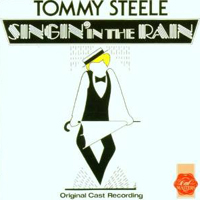
 (1 / 5) The greatness of Singin’ in the Rain — the movie, that is — was never more apparent than when it was adapted to the stage. First in London, then in the United States, people worked hard to do so: Both stage versions recreated most of the movie’s best-remembered moments in a script retooled by Comden and Green themselves, with some more songs and a lot of synthetic sparkle added. But it all fizzled out, because taking a movie musical about how movie musicals were invented and adapting it for the stage robs the story of its intimacy and what theorists call self-reflexivity. Plus, with those indelible movie performances firmly in all of our heads, who would be fool enough to try to copy Gene Kelly or Donald O’Connor? Tommy Steele sure would, at least in London. His energetic performance had a big smile pasted on everything, but little going on below the surface; although Steele is a better singer than Gene Kelly, his charm is synthetic. The rest of the cast works valiantly, but this recording stands as a splashy testimonial to the artistic bankruptcy of musical comedy in the 1980s. — R.B.
(1 / 5) The greatness of Singin’ in the Rain — the movie, that is — was never more apparent than when it was adapted to the stage. First in London, then in the United States, people worked hard to do so: Both stage versions recreated most of the movie’s best-remembered moments in a script retooled by Comden and Green themselves, with some more songs and a lot of synthetic sparkle added. But it all fizzled out, because taking a movie musical about how movie musicals were invented and adapting it for the stage robs the story of its intimacy and what theorists call self-reflexivity. Plus, with those indelible movie performances firmly in all of our heads, who would be fool enough to try to copy Gene Kelly or Donald O’Connor? Tommy Steele sure would, at least in London. His energetic performance had a big smile pasted on everything, but little going on below the surface; although Steele is a better singer than Gene Kelly, his charm is synthetic. The rest of the cast works valiantly, but this recording stands as a splashy testimonial to the artistic bankruptcy of musical comedy in the 1980s. — R.B.